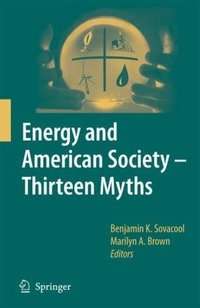Energy and American Society: Thirteen Myths
Energy and American Society: Thirteen Myths is a 2007 book about energy security and climate change, edited by Benjamin K. Sovacool and Marilyn A. Brown.[1] The book is suitable for both technical and non-technical audiences since it is written in plain English and is "easily digested by anyone with a rudimentary background or interest in energy economics".[2]
 | |
| Author | Benjamin K. Sovacool Marilyn A. Brown |
|---|---|
| Language | English |
Publication date | 2007 |
Thirteen myths
The book discusses and presents counter-arguments to thirteen propositions concerning American culture, energy, the environment, and society:[1]
- Myth One – Today’s Energy Crisis is "Hype"
- Myth Two – The Public is Well Informed About Energy
- Myth Three – High Land Requirements and an Unfavorable Energy Balance Preclude Biomass Ethanol from Playing a Large Role in Providing Energy Services
- Myth Four – The Hydrogen Economy is a Panacea to the Nation’s Energy Problems
- Myth Five – Price Signals are Insufficient to Induce Efficient Energy Investments
- Myth Six – The Barriers to New and Innovative Energy Technologies are Primarily Technical: The Case of Distributed Generation
- Myth Seven – Renewable Energy Systems Could Never Meet Growing Electricity Demand in America
- Myth Eight – Worldwide Power Systems are Economically and Environmentally Optimal
- Myth Nine – Energy Efficiency Improvements have Already Reached their Potential
- Myth Ten – Energy Efficiency Measures are Unreliable, Unpredictable, and Unenforceable
- Myth Eleven – Energy R&D Investment Takes Decades to Reach the Market
- Myth Twelve – Climate Policy will Bankrupt the U.S. Economy
- Myth Thirteen – Developing Countries are not Doing their Part in Responding to Concerns about Climate Change
Contributors
The book was produced with support from Oak Ridge National Laboratory and involved 24 contributing authors with a diverse range of backgrounds. Notable contributors include Amory Lovins and Joseph Romm.[1]
Benjamin K. Sovacool is a Visiting Associate Professor at Vermont Law School and founding Director of the Energy Justice Program at their Institute for Energy and Environment. He was formerly an Assistant Professor and Research Fellow at the National University of Singapore.
Marilyn A. Brown is an American geographer on the faculty of the Georgia Institute of Technology. She is a member of the National Commission on Energy Policy and the Tennessee Valley Authority board. She previously worked at Oak Ridge National Laboratory, where she held several leadership positions.[3][4]
Reviews
Energy and American Society: Thirteen Myths has been reviewed in Energy Policy[2] and the Annals of the Association of American Geographers.[5]
See also
References
- Benjamin K. Sovacool and Marilyn A. Brown (Eds.) (2007). Energy and American Society – Thirteen Myths (New York: Springer).
- Fereidoon P. Sioshansi. Energy and American Society—Thirteen Myths (Book Review) Archived 2011-07-16 at the Wayback Machine Energy Policy, 35 (2007), pp. 6554–6555.
- "Archived copy". Archived from the original on 2011-09-28. Retrieved 2011-11-27.CS1 maint: archived copy as title (link)
- http://www.tva.gov/news/releases/julsep10/board.html
- Pasqualetti, Martin J. (2008), "Review of Energy and American Society--Thirteen Myths, B. Sovacool, M. Brown (eds.).", Annals of the Association of American Geographers, Routledge, 98, p. 504, doi:10.1080/00045600801944210.
Further reading
- Benjamin K. Sovacool (2008). The Dirty Energy Dilemma: What’s Blocking Clean Power in the United States, Praeger.
- Miguel Mendonça, David Jacobs and Benjamin K. Sovacool, (2009). Powering the Green Economy: The Feed-In Tariff Handbook, Earthscan.
- Marilyn A. Brown and Benjamin K. Sovacool (2011). Climate Change and Global Energy Security, MIT Press.